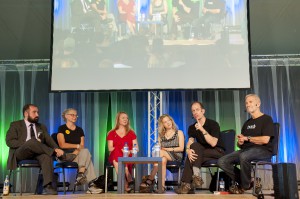 As I have mentioned before, the Dutch geekfest Observe, Hack, Make (OHM 2013) was not just a chance for geeks to play with cool tech toys, the whole event also had a very strong political track. While there was inevitably a lot of focus on whistleblowing in the wake of the Snowden disclosures, another speaker track attracted a lot of attention: global drug policy and the failure of prohibition.
As I have mentioned before, the Dutch geekfest Observe, Hack, Make (OHM 2013) was not just a chance for geeks to play with cool tech toys, the whole event also had a very strong political track. While there was inevitably a lot of focus on whistleblowing in the wake of the Snowden disclosures, another speaker track attracted a lot of attention: global drug policy and the failure of prohibition.
This was a track I suggested and I was pleased that three speakers were given the chance to discuss this on the main stage. While coming to the subject from radically different perspectives and experiences, the underlying message of all three was that the “war on drugs” was an abject failure that caused massive and increasing harm to the global population.
John Gilmore was first up. John made his dosh during the tech boom, and has since spent significant sums trying to reform the failed drug policies within his home country, the good ol’ US of A. Of course, there, it was always going to be an uphill battle. The USA is the fountain head of prohibition, ramming the drug conventions of 1961, 1971, and 1988 through the United Nations by brute diplomatic force.
To this day, the US remains the key power ensuring that the UN upholds these conventions, despite the fact that the policy of prohibition has manifestly failed, despite the fact that many countries have experimented successfully with harm reduction and decriminalisation of personal use, and despite the fact that these laws are from a different era and are wildly out of date — in the 1960s HIV and AIDS had yet to emerge, and rapidly mutating “legal highs” were unknown.
And let’s not forget that the USA is the world’s biggest consumer country of drugs. It is America that drives this illegal market. And it is in America that 20 states have legalised the medicinal use of cannabis, and two states have fully legalised the use even, gasp, purely for pleasure. The hypocrisy is breathtaking.
But change is afoot. Primarily, I believe, because the USA no longer needs the “war on drugs” as a pretext for invading/interfering with other countries, now it has the “war on terror”. But also because of the excellent work of research and educational civil society groups. The Beckley Foundation, set up by Amanda Feilding in 1998, is one such.
Amanda gave an excellent talk, focusing on the dual nature of Beckley’s work: policy and scientific research. Her view is that sound national and international policy cannot be developed unless it is based on evidence, research and facts. Yet the current “war on drugs” has become almost an article of faith that too many politicians are afraid to challenge.
Beckley aims to provide the research and the facts. It funds and establishes scientific research that enables leading scientists, such as Professor David Nutt in the UK, to research the potential therapeutic benefits of currently illegal drugs, and also to assess the different societal harms caused by all drugs, both licit and illicit. To date, the prohibition orthodoxy has inhibited free scientific research to the detriment of many people across the planet.
Amanda was pleased to be able to announce two new research projects just starting in the UK, into the potential therapeutic benefits of psilocybin (magic mushrooms) and LSD. Beckley has also recently commissioned a cost benefit analysis of the legalisation of (only) cannabis is the UK. The results will be formally announced in September, so for now I shall confine myself to saying that they are encouraging.
Using such research, Beckley is thus in a position to advise governments about developing fact-base policy. One of the key areas of the world investigating potentially beneficial alternatives to prohibition is Latin America, and Amanda has developed close working relationships with a number of governments across the region.
And understandably so — Latin America, as one of the key producer regions of the world, has been ravaged by the drug wars. Violent organised crime cartels have grown so wealthy and powerful that they can subvert whole countries, corrupt governments and law enforcement, and terrorise whole populations in their quest to dominate the illegal drugs trade.
In Mexico, since the war on drugs was ramped up 7 years ago, it is estimated that over 70,000 innocent people have been kidnapped, tortured and killed in drug-related violence. Many have simply been disappeared.
Finally I also did a talk at OHM as the European director of Law Enforcement Against Prohibition (LEAP).
LEAP is a unique voice in the global drug policy debate. The organisation, only 11 years old, has over 100,000 supporters and a presence in 120 countries. We consist of police officers, judges, lawyers, prison governors, intelligence personnel, and even drug czars. What unites us is a shared professional knowledge, experienced across the spectrum of drug law enforcement, that prohibition has egregiously failed.
Over the last 50 years drug use has exponentially increased, the potency of illegal drugs has increased, they are ubiquitously available, and the price of street drugs has gone through the floor. Faced with this information, how can our governments claim they are winning the “war on drugs” to create a “drug free world”? Quite the opposite — prohibition has enabled a global and exponentially growing black market.
I became aware of the drug prohibition failure while I was working for MI5. One of my postings involved investigating terrorist logistics, which meant that I had to work closely with UK Customs across the UK. This experience made me very aware that the “war” had been lost. It also made me very aware, early on, that there was a massive overlap between the illegal drug market and terrorist funding.
The US DEA estimates that over half of the designated terrorist groups around the world gain the bulk of their funding from drugs money. So on the one hand prohibiting drugs and fighting the “war on drugs” sends the market underground and that black money provides a key revenue stream to the terrorists. On the other hand the West is also waging the “war on terror”. What they give with one hand they take away with another.
One stark example of this is the current melt-down in Libya — country that was “gratefully” liberated by NATO two years ago. The dictator was tortured and killed, MI6 and the CIA were helping the “spontaneous” rebels. the infrastructure was ruined, and the bulk of the country is now run by bandit militias which brutalise the inhabitants pr impose hard-line Islamism on them. Many predicted this would happen, including myself.
What was not predicted was the explosion in the drug trade. Over the last decade western Africa has become one of the main transit regions between the producer countries (Latin America) and the consumer countries in Europe. It now appears that this lucrative trade has not only resulted in destabilising countries, leading to violent narco-states such as Mali and Guinea-Bissau, the trade has also become a stream of income to Al Qaeda affiliated groups in Libya. Which is bad for western security, is bad for the stability of Libya, but is also bad for the people of Libya, where there has reportedly been an explosion of drug use and rocketing infections of HIV.
There have been many successful attempts to alleviate the penalisation of drug users in many European countries — Portugal, the Netherlands and Switzerland spring to mind. Because of more liberal decriminalisation laws, all these countries have seen a decrease in drug use and associated crime, plus good health outcomes and the freeing up of law enforcement resources across the spectrum to go for the drug traders.
However, we in LEAP would argue that only full regulation, control and taxation of the drug market will deal with the scourge of the international drug trade. Until that happens, this global trade, estimated by even the UN at being worth between $320 billion and $500 billion per year, will only profit organised crime cartels and terrorist organisations.
The “war on drugs” has failed. Albert Einstein said that the very definition of insanity was to continue to do the same, even if it repeatedly fails, in the hope that you will eventually get a different outcome. That is what we are seeing with prohibition.
And the geek community understand this too. Of course they do, they are scientists. I was heartened by their interest and by their response. Let’s all campaign to end this insanity.
Here is a video of my talk at OHM on the subject:
LEAP — Ending the war on drugs and people (OHM 2013) from Annie Machon on Vimeo.




